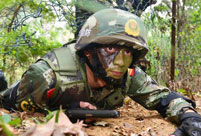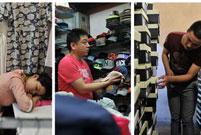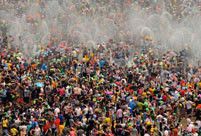 College girls call for protection of ecological space on earth
College girls call for protection of ecological space on earth
 Top 10 celebrities driving auto brands
Top 10 celebrities driving auto brands
 10 low-carbon tips to save money
10 low-carbon tips to save money
 Luxury cars make Asia premiere at Auto China
Luxury cars make Asia premiere at Auto China
 Versatile dog
Versatile dog
 Ni Ni covers BAZAAR JEWELRY
Ni Ni covers BAZAAR JEWELRY
 Cherry blossoms reach peak bloom in Washington D.C.
Cherry blossoms reach peak bloom in Washington D.C.
 Top Chinese fashion icons in foreigners' eyes
Top Chinese fashion icons in foreigners' eyes
 Asia's largest business aviation exhibition to be held in Shanghai
Asia's largest business aviation exhibition to be held in Shanghai
 World's top-rated luxury hotels
World's top-rated luxury hotels
UNITED NATIONS, April 24 -- The UN peacekeeping chief on Thursday called for international support to move the warring factions in Darfur, Sudan, toward lasting peace, as stepped-up rebel attacks, clashes fueled by local political rivalries, and mass displacement have left the long-troubled region at the crossroads.
"Once again, Darfur finds itself at a crossroads. Since the beginning of 2014, new dynamics have emerged, with considerable impact on the civilian population," said Herve Ladsous, the UN under-secretary-general for peacekeeping operations while briefing the 15-nation Security Council on the latest developments in the strife-torn western region of Sudan as well as on the work of the joint African Union-UN mission there, also known as UNAMID.
He stressed the importance of moving toward convincing parties to undertake joint negotiations.
Darfur is currently experiencing renewed violence after a relative lull, marked by massive movements of displaced persons and by very "notable and strong discord" among local allies of the Sudanese government.
The growing political rivalries were most evident in North Darfur, he said. "At stake is not merely the local government, but also the hoarding of mineral resources, (particularly) gold deposits."
Further complicating matters are the ongoing activities of the pro-government militia known as the Rapid Support Force (RSF), which expose civilians to "significant risks" particularly in north and south Darfur, he said.
Meanwhile, rebel groups that have not signed the Doha Document for Peace in Darfur (DDPD) have stepped up their attacks on the government position in the Jebel Marra area of north Darfur.
In response, the Sudanese armed forces have likewise stepped up their operations, including employing aerial bombings, which have led to the deaths and displacement of civilians.
One military operation by the Sudanese army and the RSF militia in Um Gunya area, some 50 km southeast of Nyala, has forced at least 40,000 civilians to flee, Ladsous said, citing reports of the UN Office for the Coordination of Humanitarian Affairs (OCHA).
"All of this has led to a deterioration of the humanitarian situation in Darfur. OCHA believes that the number of persons displaced since January exceeds some 370,000," he said, adding that two-thirds of those persons remain unable to return to their homes.
There are about more than two million internally displaced persons (IDPs) in Darfur, making this humanitarian crisis one of the most significant in the world.
While the majority of those newly displaced have received some form of assistance, the restrictions on movement imposed by the warring factions have not allowed relief aid to reach them quickly enough or in sufficient quantity.
"It seems that this situation should lead us to modify our response," he said, particularly noting the need to strengthen cooperation at different levels and in various contexts -- between the AU and UN; between the UN and the Sudanese government; and between UNAMID and the UN Country Team.
"All of this should be intensified in order to better support the activities of UNAMID," Ladsous said, stressing that mediation efforts should enjoy all necessary political support and the consistent involvement of the main actors towards a constructive dialogue that will lead to lasting peace.
The UN peacekeeping chief also said that in such a challenging environment, UNAMID has focused on concrete actions and measures reflecting its strategic priorities, including mediation between non-signatories to the DDPD and the government, and civilian protection.
 4th Beijing Int'l Film Festival ends
4th Beijing Int'l Film Festival ends Commando elite specializes in sign language
Commando elite specializes in sign language Man photoshops himself into girlfriend's childhood photos
Man photoshops himself into girlfriend's childhood photos Photo story: Stallholders at Beijing Zoo Wholesale Market
Photo story: Stallholders at Beijing Zoo Wholesale Market Artists on backstage
Artists on backstage Beckham launches fund to support youth soccer in China
Beckham launches fund to support youth soccer in China Cherry blossoms hit peak bloom in Washington D.C.
Cherry blossoms hit peak bloom in Washington D.C. Children in ancient costumes learn Zhusuan
Children in ancient costumes learn Zhusuan Tens of thousands celebrate Water Splashing Festival
Tens of thousands celebrate Water Splashing Festival Giant panda Sijia is back to happy life
Giant panda Sijia is back to happy life Richest Chinese of 2014: half from the mainland
Richest Chinese of 2014: half from the mainland Chengdu - laid-back lifestyle makes happiest city
Chengdu - laid-back lifestyle makes happiest city The backstage of the Fashion Week
The backstage of the Fashion Week College students in Han costumes
College students in Han costumes Postgraduate works as waitress
Postgraduate works as waitressDay|Week|Month